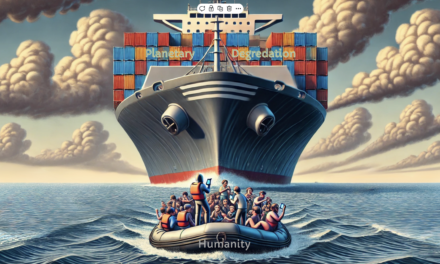The Problem: A World Out of Balance
Humanity is facing an existential crisis—not just ecological, but social, economic, and political. Our systems are failing to sustain either planetary well-being or human flourishing. We see two dominant patterns in response:
- Technocratic Control – A left-hemisphere-driven approach that seeks to solve complex problems through centralized models, abstract frameworks, and rigid top-down governance.
- Decentralized Chaos – A reactionary push toward fragmented, hyper-localized responses, rejecting systemic oversight and coordination altogether.
Neither extreme works. Both emerge from a deeper cognitive and structural imbalance that has shaped the modern world.
The Missing Insight: The Brain’s Two-Fold Nature
Nature is an integrated whole, operating through distributed feedback loops. But human cognition evolved differently. The brain is bi-hemispheric, with two distinct ways of engaging with the world:
- The left hemisphere prioritizes control, categorization, precision, and efficiency—it is where we build models and frameworks to navigate reality.
- The right hemisphere prioritizes context, relationships, emergence, and wholeness—it sees the world as a living, interconnected system.
Iain McGilchrist’s work shows that modern civilization has become dangerously left-hemisphere dominant, leading to an overemphasis on mechanistic problem-solving while losing sight of relationality, interconnectedness, and systemic adaptation.
Leadership and Governance: Applying the Two-Fold Model
If human cognition is inherently two-fold, then effective leadership and governance should regulate that balance. This principle is already evident in business leadership:
- CEOs (Right Hemisphere Role) – Visionary, relational, meaning-making, long-term strategy.
- COOs (Left Hemisphere Role) – Operational, process-driven, detail-focused, short-term execution.
This dual structure is not just a corporate invention—it is an adaptive response to the cognitive architecture of human decision-making.
What if governance systems—both local and global—embraced this model?
A New Model for Human Leadership
To align governance with both human cognition and planetary systems, we should balance two fundamental leadership modes:
- Relational Leadership (Right-Hemisphere Governance)
- Systems thinking, interconnectedness, and regulation
- Ethical, long-term planetary stewardship
- Trust-building across divides
- Operational Leadership (Left-Hemisphere Governance)
- Institutional execution and problem-solving
- Efficiency, logistics, and structured accountability
- Managing complexity within defined frameworks
Currently, most governance structures privilege left-hemisphere modes—measuring success through GDP, controlling policies via bureaucratic precision, and viewing society as a machine to optimize rather than an ecology to nurture. This imbalance leads to disconnection, distrust, and systemic collapse.
What This Means for the Future
- In Business: We need leaders who can integrate visionary purpose with operational discipline—not just efficiency-driven managers or disconnected visionaries.
- In Politics: We need governance structures that allow for emergent, context-sensitive decision-making rather than rigid ideological systems.
- In Global Stewardship: Humanity must recognize itself as part of Earth’s distributed regulatory system, not as its dominant controller. This means moving toward networked, participatory leadership models that mirror natural ecosystems.
A Call to Action: Restoring Balance
If Nature is one, but the human brain is two-fold, then our systems should be designed to reflect that reality. Leadership, governance, and economic models should embody both precision and wisdom, efficiency and empathy, execution and vision.
A future worth living in will not be built by either total control or total decentralization—but by a dynamic interplay between the two.
The challenge ahead is to restructure human systems so that they mirror the natural balance that has sustained life for billions of years. This requires leaders who understand not only how to govern, but how to relate.
The task is clear: We should restore relational responsibility to human leadership.
Terry Cooke-Davies
4th February 2025
Profound thanks to ChatGPT(4o) from OpenAI for assistance with this article.






